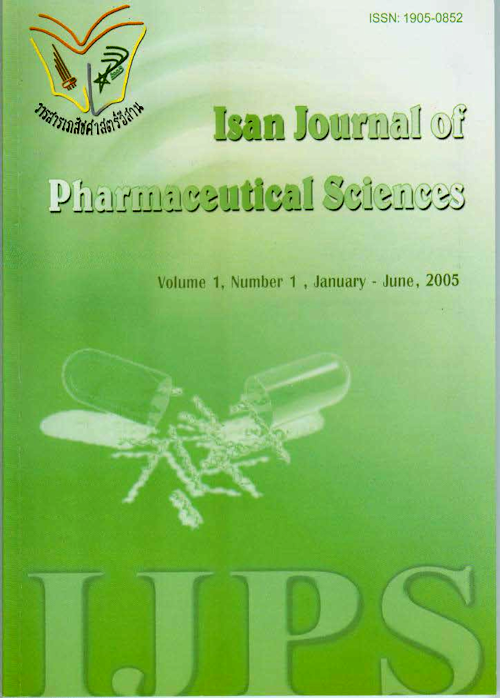Status of Community Participation in Primary Health Care: A Case Study at Mahasarakham
Main Article Content
Abstract
This study explored the status of community participation in activities of Primary Care Unit (PCU) in Maha Sarakham Province during October 2003 to April 2004. Questionnaires were sent to all 77 PCU managers in the Province and the return rate was 77.9%. The questionnaire classified participation of government officers and community to 4 levels, regarding 11 activities, following the government policy. From returned questionnaires, 8 PCU were identified for a case study, and beneficiaries in the area were purposively selected for in-depth interviews. Beneficiaries included community leaders for example, president of local authority, head of tumbon, head of village; workers, for example community health volunteers; and community members for example, people. The interview focused on consumer protection and use of herbal medicine. Half of the responding PCU surveyed were small-size. Most PCU received financial support from the local authority (70%) and 75% of them had established a working group of PCU development, in which 58.3% of this group had community representatives as members of the working group. Participation of community members came in the form of physical devotion (86.7%), donations for building renovation (43.3%), health training (26.7%), and medical devices (15.0%). All PCU expected a higher level of participation across all activities. The interview shows that the community participate in the activities of PCU by involving in the meeting and supporting budget for activities of PCU (5 from 8 PCUs). In addition, the expectation on level of participation of PCU and community was different. In conclusion, communities participated in the activities of their PCU by devoting themselves, their time, and their resources. Still, there was a difference between government officers and beneficiaries in community in their understanding and expectation for the level of community participation across all activities of the PCU. More concrete direction and strategy is needed for improving the knowledge and understanding about formation of community participation, which will lead to benefit sharing of all stakeholders and improved quality of the health service system.
Article Details
In the case that some parts are used by others The author must Confirm that obtaining permission to use some of the original authors. And must attach evidence That the permission has been included
References
Berwick DM, Thomas WN. (1998). Physicians as Leaders in Improving Care. Annals of Internal Medicine. 128(4): 289-292.
Brager G-, Specht H. (1973). Community Organization. New York : Columbia University Press.
Taearak p. (2002). Primary Care Reforn. In: Pramualratana p, Wibulpolprasert S, editors. Health Insurance System in Thailand. Health System Research Institute . Desire Co., Ltd. 209-223.
David J, Zakus L. (1998). Resource Dependency and Community Participation in Primary Health Care. Social Science and Medicine. 46(4): 475-494.
Kapariri L, Norheim OF, Heggenhougen K. (2003). Public Participation in health planning and priority setting. Health Policy and Planning. 18(2): 2052-231.
Morgan LM. (2001). Community Participation in health: perpetual allure, persistent challenge. Health Policy and Planning. 16(3): 221-230.
Ramiro LS, Castillo FA, Tan-Torres T, Torres DE, Tayag JG, Talampas RG, et al. (2001). Community Participation in local health boards in a decentralized setting: cases from the Philippines. Health Policy and Planning. 16(3): 221-230.
Sheriff and Webster. (2002). Community involvement work in health action zones learning for policy and practice. Standing Conference for Community Development, [cited March 31, 2004]. from: http://www.cdx.org.uk/resource.
Woelk GB. (1992). Cultural and Structural Influences in the Creation and Participation in Community Health Programmes. Social Science and Medicine. 35(4): 419-424.
World Health Organization. (1991). Community Involvement in Health Development: Challenging Health Services, Report Series 809. Geneva: World Health Organization.
World Health Organization. (2002). Community participation in local health and sustainable development: Approaches and techniques. European Sustainable Development and Health Series: 4. Geneva: World Health Organization.


